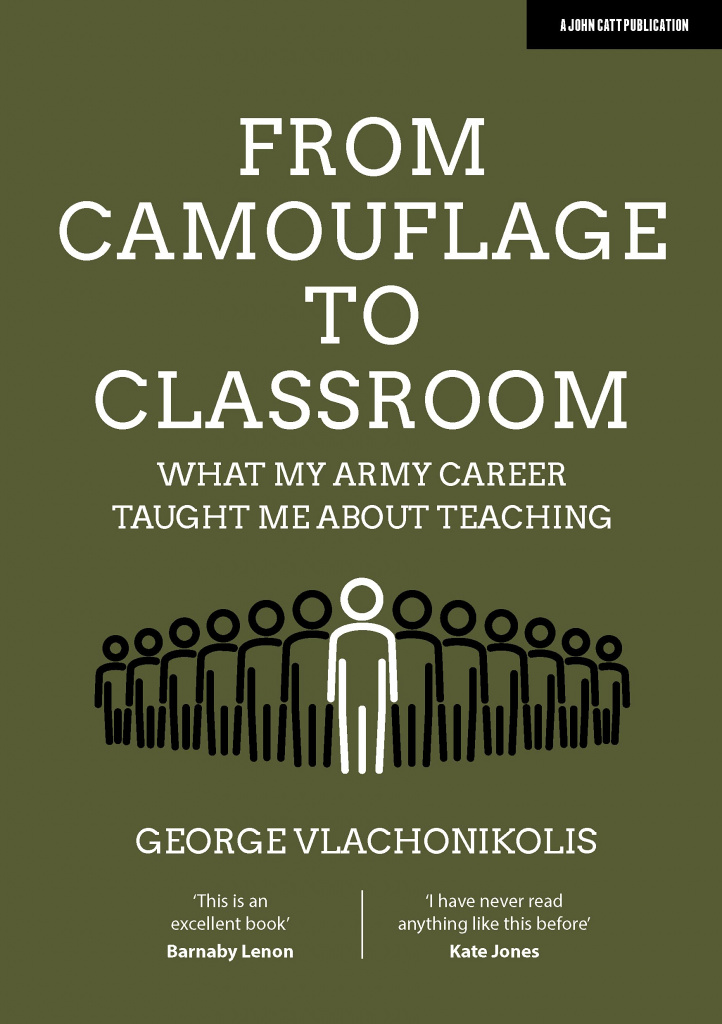
Ten years ago, I left the Army and became a teacher. And in that time I’m sure I’ve faced a lot of the same challenges that all classroom teachers have:
- Awful work-life balance
- Difficult students
- Too tired to plan adequately
- Crisis of confidence in subject knowledge
- Restrictive policy documents
- Endless email
- Sharp-elbowed parents
Annoyingly, I never managed to find very many solutions to any of these problems in the places you’re supposed to find them – teacher books or teacher training. Instead, the most valuable sources of wisdom for me have been mentors, becoming an examiner, and my Army career.
Mentors and examining helped me to build my confidence in subject knowledge. I hit the jackpot in my first school and worked under probably one of the best heads of departments in the country, he showed me what great economics lessons looked like. The examining side then exposed me to huge quantities of students’ work which over time, enabled me to separate A-grade scripts from A*-grade scripts. After that, I truly understood the standard I needed to aim for.
As for all the other challenges then? Many of the educational books I read just seemed to be telling me off – ‘here is something else you should be doing in class’, ‘here is the latest scientific advice which contradicts the last bit of advice’, ‘here are 10 things that all teachers have forgotten to do’. CPD course and Inset training haven’t tended to be much better. So naturally I looked for inspiration in things I knew worked – and most of them were based on my military experiences.
I did not have a typical military career. After a year of leadership training at Sandhurst, I commissioned in 2006 into the Educational and Training Services (ETS), where I studied for my PGCE. However, I quickly pursued attachments with other units to broaden my experience and I ended up on two operational tours to Afghanistan as part of infantry battle groups. In 2007 I deployed with the Worcestershire and Sherwood Foresters Regiment, and three years later I deployed with the Scots Guards and continued with the 2nd Battalion, Scots Regiment when they rotated in the theatre.
From Camouflage to Classroom is my attempt to distil everything I learned from my time in the British Army in Afghanistan and then brought to my classroom teaching. The book’s aim is to make a positive contribution to real teachers in real schools, teaching real students – and, as such, it is meant to be something different from the usual fodder. Instead of relying on academia to justify my conclusions, I use lived military experiences to actually cut through a great many of the fads and bogus theories around teaching.
To give you an example, let’s talk about patrol bases – I ask teachers to consider their classrooms as a patrol base. Patrolling is when a platoon will explore a geographical area for the purpose of observing or maintaining security. A patrol base is set up when a platoon is conducting patrols for an extended period of time.
Patrolling in Afghanistan wasn’t always much fun. We would line-up at the gates of the patrol base and wait for a signal to go. At that point, we would run through the perimeter, zig-zagging, until such a point we could slow down into a routine formation and crack on. An hour or so later, with the objective complete, we’d return back to the patrol base.
It’s during the lining-up and getting ready to go that it hits you – fear, anxiety, tension. It wasn’t uncommon for lads to cross themselves and vomit on their boots before the gates opened. Thinking that in two minutes you might be walking head-first into an ambush or stepping on an IED, does strange things to your physiology.
Without exaggeration, I suspect this is how some of our students feel at the beginning of any new lesson – fearful, anxious, tense. Knowing that in two minutes, as they explore the new terrain, their whole world might ‘blow up’ in front of them as they are faced with uncertainty about if they will be successful. Students like this can often be labelled as ‘difficult’ and it can be a real challenge to engage them in a lesson.
The patrol base has an important role to play here. If we want the ‘difficult’ students to join us on the learning journey and take what they consider to be a risk, then we should take a leaf from the platoon commander’s handbook and create an environment where students come through the door knowing that the classroom is a safe space. Even if it’s just for the duration of the lesson, let’s hope they can put aside their fear and anxiety, and wonder at the joys of the subject being explored.
By contrast, I despair at practitioners and CPD trainers that challenge teachers to be more assertive all the time – ‘this is my classroom and these are the rules!’. It seems to be coming from some notion that we need to establish the hierarchical status of the classroom to get anything done. Or, that we need to be assertive in order to achieve some alpha victory and show everybody how tough we are, so they don’t play up. Sadly, this just sows the seed for a power play conflict. The classroom itself ends up becoming the actual battlefield rather than the patrol base it should be. Learning is much harder under these circumstances.
The book’s premise, therefore, is that there are a number of military principles out there that can cross over effectively into our field of classroom teaching. By taking a sideways look at what platoon commanders do in the Army, in particular, I hope to illuminate some wider principles about classroom teaching, including building positive relationships with students.
To learn more about ‘From Camouflage to Classroom’ by George Vlachonikolis, priced at just £15 please click here.
George Vlachonikolis is the Head of Economics at Headington School, Oxford and is the PGCE Lead for Economics at the University of Buckingham.
Register for free
No Credit Card required
- Register for free
- Free TeachingTimes Report every month
